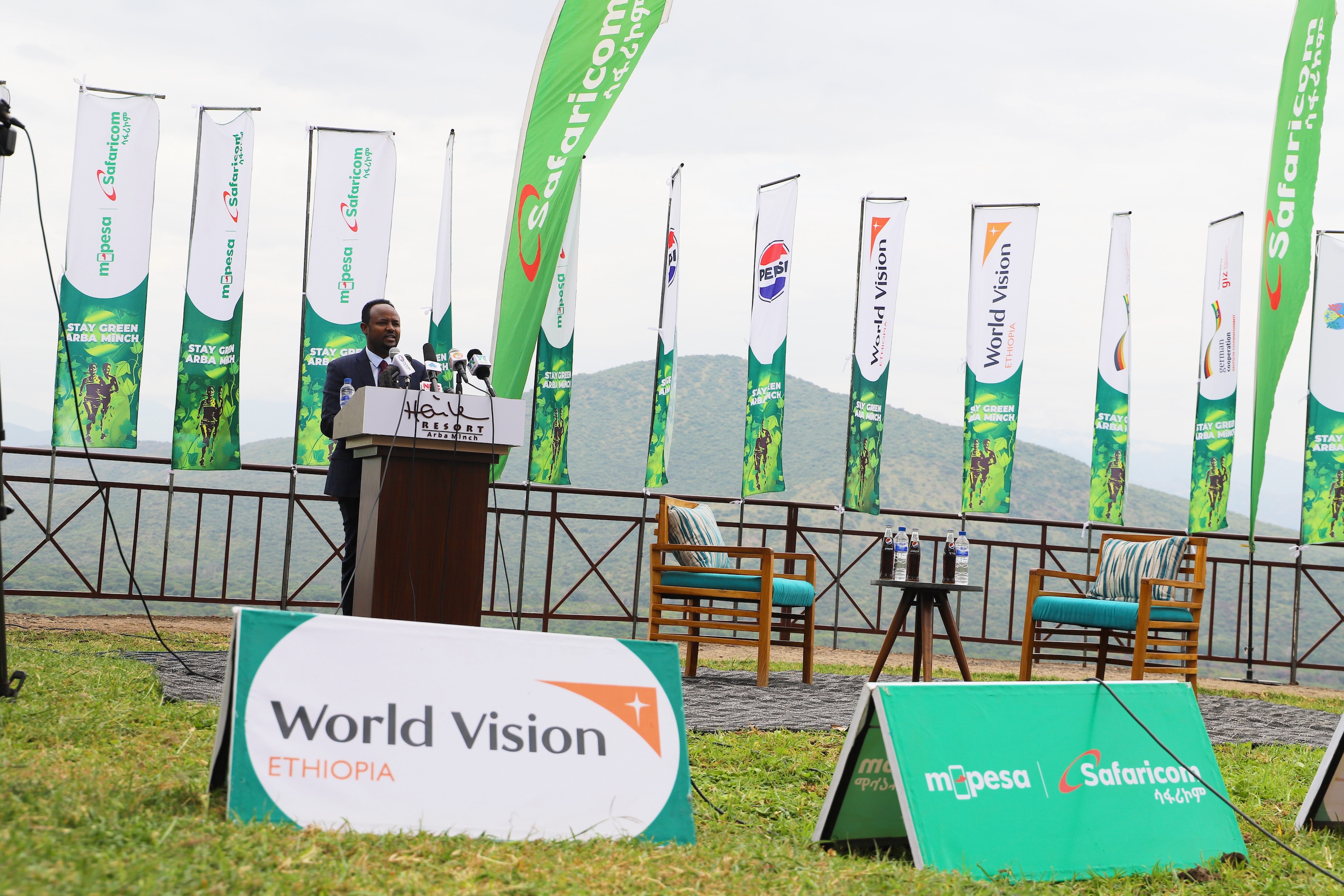World Vision Ethiopia participates in the 2024 Safaricom Great Arba Minch Run
World Vision Ethiopia participated in the 2024 Safaricom Great Arba Minch Run event organised by Safaricom Ethiopia and its cohosting partner M-PESA on 14 July 2024 under the theme “Stay Green Arba Minch”. The event said to be Ethiopia’s most environmentally friendly race, aimed to promote environmental sustainability through afforestation/reforestation, rehabilitating degraded lands, reducing carbon emissions, and raising awareness within the community about responsible waste disposal and recycling.
World Vision believes that the event coincides with its global environmental initiatives' strategic plan of restoring 1 billion hectares of degraded land worldwide, including 4.6 million hectares in Ethiopia by 2033. World Vision Ethiopia has developed Farmer Managed Natural Regeneration (FMNR) scale-up business strategy to restore 700,000 hectares of degraded land through its area programmes located throughout the country. It also planned to mobilise project participants, partners, and the wider community to restore 3,900,000 hectares of degraded land through its environmental advocacy works.
The race featured a 7 km adult race and a 3 km children’s race. The running track is populated with several slogans that promote environmental sustainability through renewing, regenerating, rehabilitating, afforestation and reforestation, carbon emissions reduction, waste disposal, and recycling. While jogging, the race participants chanted phrases such as “Run fast, restore nature fast,” "Revive your land by nurturing hidden potential," "Restore balance with FMNR," and "Recover resources for a sustainable future".
35-year-old Matewos Mafeni, a father of two, was one of the race participants. He says, "Climate change, land degradation, and desertification have all had a significant detrimental influence on our livelihood. Our forefathers used to harvest six tonnes of maize from one acre of land. However, now, due to severe soil erosion and land degradation, the land's productivity has decreased threefold, leaving us unable to feed our families properly. The springs that used to flow year-round have dried up, making our irrigation farming impossible.”
Mathewos has recently received Farmer-Managed Natural Regeneration (FMNR) training from World Vision and is beginning to see some changes in his farmland productivity. The training he received on FMNR has inspired him to participate in the Safaricom Ethiopian Great Arba Minch Run and to advocate for the renewing, regenerating, and rehabilitating of degraded land.
He says, "It is possible and real to bring back the degraded land to its origin through FMNR. This only needs a shift in mindset and a commitment to land regeneration. The FMNR practice has given me hope that we can restore degraded land, boost farmland fertility, and be able to produce enough food for our family.”
 During the media awarding ceremony, H.E. Aklilu Taddesse, the State Minister for Tourism, remarks, "This race is committed to promoting environmental sustainability through renewing, regenerating, restoring the land, lowering carbon emissions, managing waste disposal, and recycling. I urge everyone to prioritize recovering degraded land, regulating waste disposal, and promoting afforestation and reforestation to guarantee that our ecosystem services are sustainable for current and future generations."
During the media awarding ceremony, H.E. Aklilu Taddesse, the State Minister for Tourism, remarks, "This race is committed to promoting environmental sustainability through renewing, regenerating, restoring the land, lowering carbon emissions, managing waste disposal, and recycling. I urge everyone to prioritize recovering degraded land, regulating waste disposal, and promoting afforestation and reforestation to guarantee that our ecosystem services are sustainable for current and future generations."
Yidnekachew Wondaferahu, World Vision Ethiopia Integrated Livelihood and Nutrition Security Technical Programme Head, said, “Compound hazards of climate change are causing a multiple impact on the lives and livelihoods of the most vulnerable communities, especially the children. According to the 2023 UNICEF five-year (2016–2021) report, about 1.3 million Ethiopian children were displaced by the compound hazards of climate change ( https://www.unicef.org/media/145951/file/Climate ). World Vision Ethiopia has been implementing multifaceted environmental projects as of 2006 massively across the country and has been able to restore 168,000 hectares of degraded landscape to ensure a sustainable environment for the community and children it serves.”
He remarked that the restoration of the environment is in the custody of human beings. “If we wish to improve the lives of future generations, we have no choice but to commit ourselves to working hard to restore the degraded land to its former glory. Let us come together, work hand in hand, and dedicate ourselves to preserving our children's future lives as well as the sustainability of the entire ecosystem and biodiversity,” he explains.
The event participants cleaned the city and planted tree seedlings led by His Excellency Mr. Aklilu Taddese, in the World Vision Ethiopia Lante FMNR learning and demonstration site.
By Aklilu Kassaye, Field Communication Manager, World Vision Ethiopia